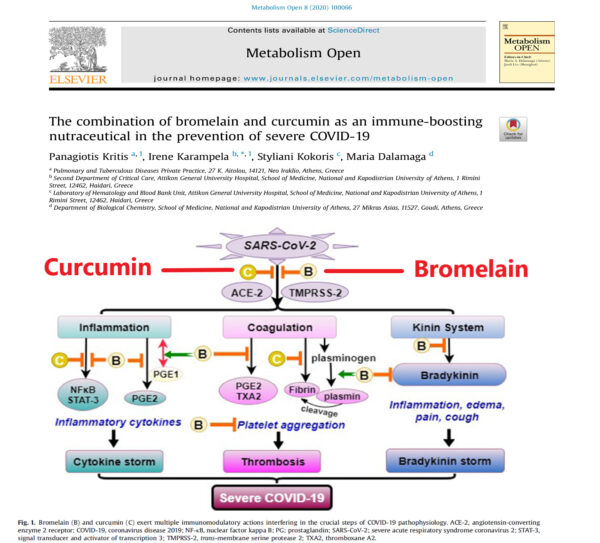Bromelain, Curcumin and Spike Protein: Battling Recurrent SARS-CoV-2 Spike Protein Exposures

“The antiviral actions of curcumin against multiple viruses (influenza and hepatitis viruses, herpes viruses, human papillomavirus, human immunodeficiency virus, severe acute respiratory syndrome coronavirus, and other coronaviruses), bacteria, and fungi have been established by experimental evidence [8]. Remarkably, recent evidence from in silico studies has demonstrated that curcumin prevents SARS-CoV-2 entry into cells by blocking the viral binding sites and the cell ligands (spike protein, ACE-2 receptors, and basigin), downregulating trans-membrane serine protease 2 (TMPRSS-2), and by interfering with viral replication through the interaction with various viral proteins [4]. However, the minimal absorption of curcumin following oral administration presents a major limitation in its bioavailability [6].
“Bromelain is a cysteine protease, isolated from the pineapple stem (Ananas comosus) [9]. Traditionally, it has been used for its anti-inflammatory and healing effects in cases of arthritis and injury, while it has been approved in Europe for the debridement of burn wounds. Experimental studies have demonstrated that bromelain presents unique immunomodulatory actions:
- Downregulation of the pro-inflammatory prostaglandin E2 (PGE-2) through inhibition of NF-kB and cyclooxygenase 2 (COX-2)
- Upregulation of the anti-inflammatory PGE-1
- Activation of inflammatory mediators (interleukin 1b, interleukin-6, tumor necrosis factor-a, and interferon-g) as an acute response to cellular stress, but also inhibition of inflammatory mediators in states of overt cytokine production
- Modulation of T-cell responses in vitro and in vivo
- Enhancement of T cell-dependent, antigen-specific B cell antibody responses [5,10e14]
“Importantly, bromelain exerts dose-dependent anticoagulant effects:
- Downregulation of PGE-2 and thromboxane A2 (TXA2), thus leading to a relative excess of prostacyclin
- Promotion of fibrinolysis by stimulating the conversion of plasminogen to plasmin and prevention of platelet aggregation
“Bromelain also hydrolyzes bradykinin and reduces kininogen and bradykinin levels in serum and tissues, improving inflammation and edema as shown in animal studies [15]. Notably, the latter action supports the potential role of bromelain in alleviating COVID-19 symptoms such as cough, fever, and pain, and the more serious implications of inflammation, thrombosis, and edema. The effect of bromelain on PGE-2 inhibition exceeds that of prednisone and aspirin, presenting very low toxicity and no major side effects …
“Interestingly, a recent experimental study demonstrated that bromelain inhibits infection of VeroE6 cells by SARS-CoV-2 by blocking the virus binding and entry into cells via downregulation of ACE-2 and TMPRSS2 expression, and cleavage of the SARS-CoV-2 spike protein, presenting a novel, promising therapeutic option that warrants further investigation.”
In summary, the combination of curcumin and bromelain is well positioned to be supplements for people who are getting repetitive COVID-19/spike protein exposure. Future randomized trials will elucidate the clinical benefits of specific applications.
Reposted from Peter A. McCullough’s Substack
◇ Reference
Best Comments
Black Pepper is good for people in small to moderate doses anyway.
Best thing is to take them together.
Otherwise the article is right.
- D
Lol…..complete jibberish to the average/non-average reader. I would advise all of the doctors and scientists to at least condense the actual meaning down to 1 paragraph that the average/below-average reader could understand so that we could share the information.






.png)

Comments
Post a Comment